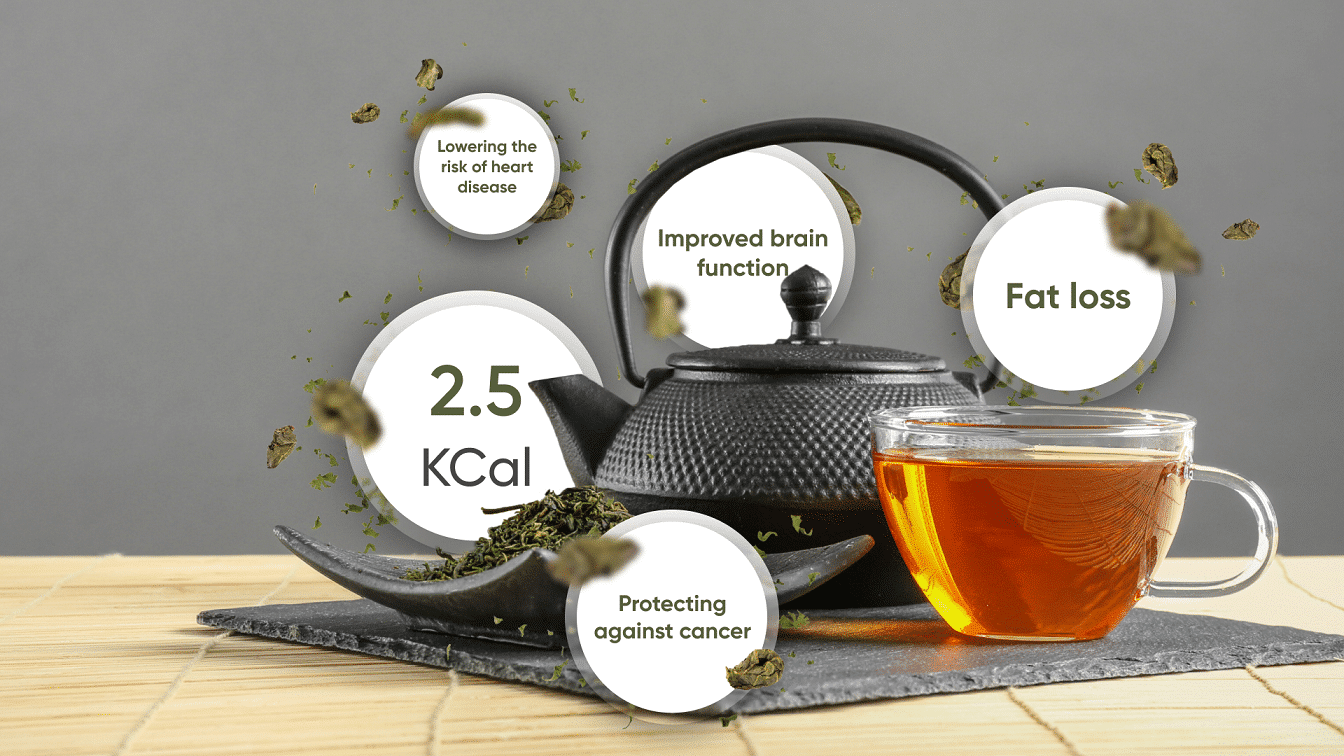Green tea is a popular drink in many cultures, and for a good reason. It’s packed with antioxidants and other nutrients. The advantages of drinking this tea often outweigh the disadvantages for many people.
Get your personalized
meal plan!
With that said, people often consume far more green tea than what is considered healthy, unaware of the likely side effects. What are these side effects? And how much green tea should you drink if you’re trying to maximize its benefits and minimize any possible detriments? Read on to learn about both the disadvantages of green tea and the amounts that are safe for consumption.
Green Tea Health Benefits
The key to the health benefits of green tea is the high concentration of antioxidants called catechins. Catechins are also found in fruits like plums, cherries, oranges, and grapefruits.
Some of the advantages of drinking a cup or two of green tea daily include:
Reduced Risk Of Cardiovascular Disease
Green tea has been shown to aid in reducing the risk of cardiovascular diseases. It is rich in catechins that may protect LDL (bad cholesterol) from oxidation and reduce inflammation in blood vessels (12).
Improved Dental Health
Tea drinkers don’t suffer from dental caries as much as coffee drinkers because green tea inhibits bacteria responsible for tooth decay; it also kills bacteria and viruses and prevents plaque formation and gingivitis (8).
Reduced Cancer Risk
Studies suggest that the catechins in green tea may stop tumor cells from growing and prevent cancers of the oral cavity, skin, lung, and breast. Green tea may also be effective in destroying cancerous cells in the bladder and colon (2).
Enhanced Immunity
Antioxidants combat free radicals, which cause damage to immune system cells. This helps support a healthy immune system, enabling your body to fight off infections better (2).
Weight Loss
The combination of caffeine and catechins in green tea speeds up metabolism, leading to a mild form of natural weight loss. Both caffeine and catechins may also suppress appetite, which results in a lesser intake of food (22).
Boosted Energy Levels
Catechins in green tea increase the metabolic rates of cells, which results in increased energy levels. Studies have shown that even moderate consumption of green tea can result in 7% more energy expenditure! Green tea also contains caffeine, about a quarter the amount found in coffee beans and half the caffeine found in black teas.
If you tend to let yourself off the hook, raise the white flag when things get tougher than you expected, send yourself on an unconscious binge-eating trip – BetterMe app is here to help you leave all of these sabotaging habits in the past!
Healthy Skin
Green tea contains polyphenols that are believed to reduce damage caused by ultraviolet radiation to skin cells, leave your skin smoother, and add a glow to your face without causing any harm or burning sensation.
The polyphenols in green tea have been shown to have antioxidants and other effects that may help protect the skin from sun damage (19).
Protection Against Diabetes
Epidemiological studies from countries where green tea is common have suggested that those who drink higher amounts of green tea regularly may have a lower risk of developing type 2 diabetes. However, clinical trials have yet to establish any effect of green tea or its extracts on glycemic control (21).
Anti-Inflammatory Properties
Acutely and chronically, inflammation is related to a variety of diseases such as metabolic syndrome, cardiovascular disease, arthritis, or Alzheimer’s disease. Green tea has been shown to reduce inflammatory response by increasing production of anti-inflammatory cytokines and decreasing production of proinflammatory cytokines (1).
Prevention Of Parkinson’s Disease
In vitro, polyphenols present in green tea inhibit the formation of protein aggregates called oligomers that are known to cause cellular death in brain cells. It also induces the activity of an enzyme called superoxide dismutase, which is used by the body to produce glutathione (GSH), a natural antioxidant that works against oxidative stress and the resulting damage caused due to free radicals. GSH depletion has been implicated in Parkinson’s disease (18). It is unclear, however, whether drinking green tea would provide a sufficient dose of polyphenols to have a protective effect against Parkinson’s disease in humans.
Enhancement Of Exercise Performance
Green tea contains caffeine which provides mild stimulation without making you too jittery or nervous. This can help athletes push harder for longer durations as it boosts fat oxidation during exercise, thus allowing them to train harder and longer (13).
Longevity
People who regularly drink green tea could possibly have a lower risk of dying from chronic disease. The antioxidant properties in green tea reduce free radical damage and oxidative stress, which is believed to be a major cause of chronic diseases, including neurodegenerative diseases and cancer (2).
Green Tea Side Effects
Despite having positive impact on health, green tea has following side effects:
Caffeine In Green Tea
The caffeine content in green tea can be high enough to cause problems for people who are sensitive to caffeine. Even if you’re not sensitive to the effects of caffeine, it may still make sense to limit yourself to three cups per day — or less — so you don’t experience the jittery feeling.
It can be tempting to drink a lot of green tea when you’re under stress, but the caffeine in it can make your anxiety worse. Drinking too much caffeinated tea may cause your body’s adrenal glands to produce more cortisol, a hormone associated with long-term stress and elevated blood sugar levels (6).
For those who have trouble sleeping, drinking a lot of caffeinated tea can make it harder to fall and stay asleep. It also means that you’ll tend to wake up feeling less refreshed and more tired than you would if you let yourself get all the sleep that your body needs each night (11).
That’s not all! Caffeine is also addictive (5). While it’s not as addictive as some other substances, people can develop a strong craving for the stimulant when they have been drinking too much caffeinated tea over an extended period, and can experience withdrawal symptoms if they stop drinking it.
In addition to being addictive, caffeine has been associated with wide-ranging health issues, including increased levels of certain stress hormones in the body, depression and anxiety disorders, premature aging, and low bone mass. It may even increase blood pressure and decrease immune function (23).
If you’re going to drink green tea regularly, it makes sense to learn how much caffeine is in it so that you can moderate your consumption to avoid any problems associated with large amounts of caffeine.
In general, to get the biggest benefits and the fewest side effects from green tea, you should limit your intake to no more than a cup or two per day. You may want to start with just half a cup and assess how that affects you before deciding whether you can safely drink more.
Read More: Is Matcha Or Green Tea Better For Weight Loss? Breaking Down The Differences
Liver Issues
For people who already have liver damage due to alcohol consumption or hepatitis C, using green tea can exacerbate their existing problems. This is because the compounds found in green tea called catechins can interfere with two enzymes involved in metabolizing alcohol – CYP2E1 and ADH (3).
This interference can cause additional stress on the liver, which is already working overtime to detoxify the body in these conditions.
Looking for a way to break the vicious cycle of weight loss and tone up all the jiggly parts? Watch the extra pounds fly off and your muscles firm up with the BetterMe app!
Anemia And Iron Deficiency
Iron deficiency is a common problem worldwide, especially in women. Some research has suggested that the high tannin content of green tea can lower iron absorption (15).
While there are many sources of iron found in both plant and animal-based foods (and even fortified processed foods), green tea could exacerbate an existing iron deficiency by further reducing the amount of available iron for red blood cell formation. That’s because it inhibited dietary nonheme-iron absorption, the type of iron found in plant foods, which is not as easily absorbed as heme-iron from meat sources (16).
Drinking more than four cups of green tea per day for longer than this could lead to iron deficiency anemia, a condition in which the body doesn’t have enough red blood cells due to a lack of iron. Another tip is to avoid drinking green tea with meals that contain iron-rich foods.
Miscarriage Risk
Due to the high caffeine content in green tea, it’s not safe for pregnant women in high amounts. This is because caffeine can stimulate the uterus and cause contractions. This may increase the risk of miscarriage or other problems like premature labor (5).
Additionally, some research has found that drinking large amounts of caffeine is associated with low birth weight infants in mothers who are already considered at risk for preterm delivery (17). This suggests that consuming too much caffeine during pregnancy could put your baby at risk for health problems later in life due to inadequate fetal development.
Scientists are still looking into links between caffeine consumption during pregnancy and low birth weight, however, it’s best to be on the safe side until more is known about any potential risks associated with pregnancies that might occur while drinking green tea every day. Talk to your OB/GYN about caffeine during pregnancy and how much you should limit your intake.
Birth Control Effectiveness
Using oral birth control pills, the contraceptive patch, or the vaginal ring? Drinking too much green tea could potentially cause side effects with these methods. Birth control pills can decrease how quickly the body breaks down caffeine, potentially increasing the side effects of caffeine you experience – especially if you are sensitive.
Bleeding Disorders
Catechins in green tea could also interfere with the activity of platelets that are necessary for blood clotting. Avoiding or limiting green tea consumption if you are on blood thinning medication such as warfarin may prevent interference with platelet aggregation and reduce your risk of excessive bleeding during surgical procedures.
Heartburn And GERD
Drinking too much green tea also has been associated with heartburn, acid reflux, and gastroesophageal reflux disease (GERD). This is likely due to its caffeine content. Caffeine relaxes the lower esophageal sphincter muscle, which separates the stomach from the esophagus. This may contribute to an increased risk of acid regurgitation into the esophagus and symptoms for people diagnosed with GERD (9).
Read More: Tea That Makes You Lose Weight: Health Benefits And Side Effects
How Much Green Tea Should You Drink?
If you’re very sensitive to caffeine, be sure to limit yourself to a cup or two a day.
If you are pregnant or breastfeeding, limit your daily intake of green tea to two cups per day (assuming no other caffeinated beverages). Drinking more than that can cause problems for your unborn child or your baby (10).
If you aren’t sensitive to caffeine, you can probably drink up to four cups a day.
For weight loss, it’s best to drink a cup of green tea in the morning before you eat. Doing this increases your metabolic rate during the day, especially if you don’t have any caffeine after noon.
If you’re taking any medicines, check with your doctor first before adding green tea into your diet. Some of the medicines that you could interact with include blood thinners, potassium supplements, or salt substitutes containing potassium.
Summary
Often with foods and beverages that carry benefits, as well as risks, it’s safest and most sensible to drink them in moderation. Drinking a cup or two of green tea per day shouldn’t cause problems for most people. If you find that more than this upsets your stomach, interferes with sleep, or exacerbates existing medical conditions such as GERD, consider limiting your consumption accordingly.
DISCLAIMER:
This article is intended for general informational purposes only and does not address individual circumstances. It is not a substitute for professional advice or help and should not be relied on to make decisions of any kind. Any action you take upon the information presented in this article is strictly at your own risk and responsibility!
SOURCES:
- An Update on the Health Benefits of Green Tea (2016, mdpi.com)
- Beneficial effects of green tea: A literature review – Chinese Medicine (2010, cmjournal.biomedcentral.com)
- Brewing thoughts: green tea and liver injury (2020, qualitymatter.usp.org)
- Caffeine, Oral Contraceptives, and Over-the-Counter Drugs-Reply (1989, jamanetwork.com)
- Caffeine and Miscarriage Risk (2008, journals.lww.com)
- Caffeine Stimulation of Cortisol Secretion Across the Waking Hours in Relation to Caffeine Intake Levels (2008, ncbi.nlm.nih.gov)
- Caffeine Use Disorder: A Comprehensive Review and Research Agenda (2013, ncbi.nlm.nih.gov)
- Camellia sinensis (Tea): Implications and role in preventing dental decay (2013, ncbi.mlm.nih.gov)
- Effect of decaffeination of coffee or tea on gastro-oesophageal reflux (1994, pubmed.ncbi.nlm.nih.gov)
- Effect of the consumption of green tea extract during pregnancy and lactation on metabolism of mothers and 28d-old offspring | Scientific Reports (2018, nature.com)
- Effects of caffeine on sleep quality and daytime functioning (2018, ncbi.nlm.nih.gov)
- Green Tea Catechins and Cardiovascular Health: An Update (2009, ncbi.nlm.nih.gov)
- Green Tea Catechins and Sport Performance – Antioxidants in Sport Nutrition (2015, ncbi.nlm.nih.gov)
- Hemochromatosis – StatPearls (2021, ncbi.nlm.nih.gov)
- Impact of Tannin Consumption on Iron Bioavailability and Status: A Narrative Review (2017, academic.oup.com)
- Iron deficiency anemia due to excessive green tea drinking (2016, ncbi.nlm.nih.gov)
- Maternal caffeine intake during pregnancy is associated with risk of low birth weight: a systematic review and dose-response meta-analysis (2014, bmcmedicine.biomedcentral.com)
- Neuroprotective Properties of Green Tea (Camellia sinensis) in Parkinson’s Disease: A Review (2020, mdpi.com)
- Protective Mechanisms of Green Tea Polyphenols in Skin (2012, hindawi.com)
- Skeletal fluorosis in relation to drinking water in rural areas of West Azerbaijan, Iran | Scientific Reports (2017, nature.com)
- The Effects of Green Tea on Obesity and Type 2 Diabetes (2013, ncbi.nlm.nih.gov)
- The effects of green tea on weight loss and weight maintenance: a meta-analysis | International Journal of Obesity (2009, nature.com)
- The Safety of Ingested Caffeine: A Comprehensive Review (2017, frontiersin.org)















